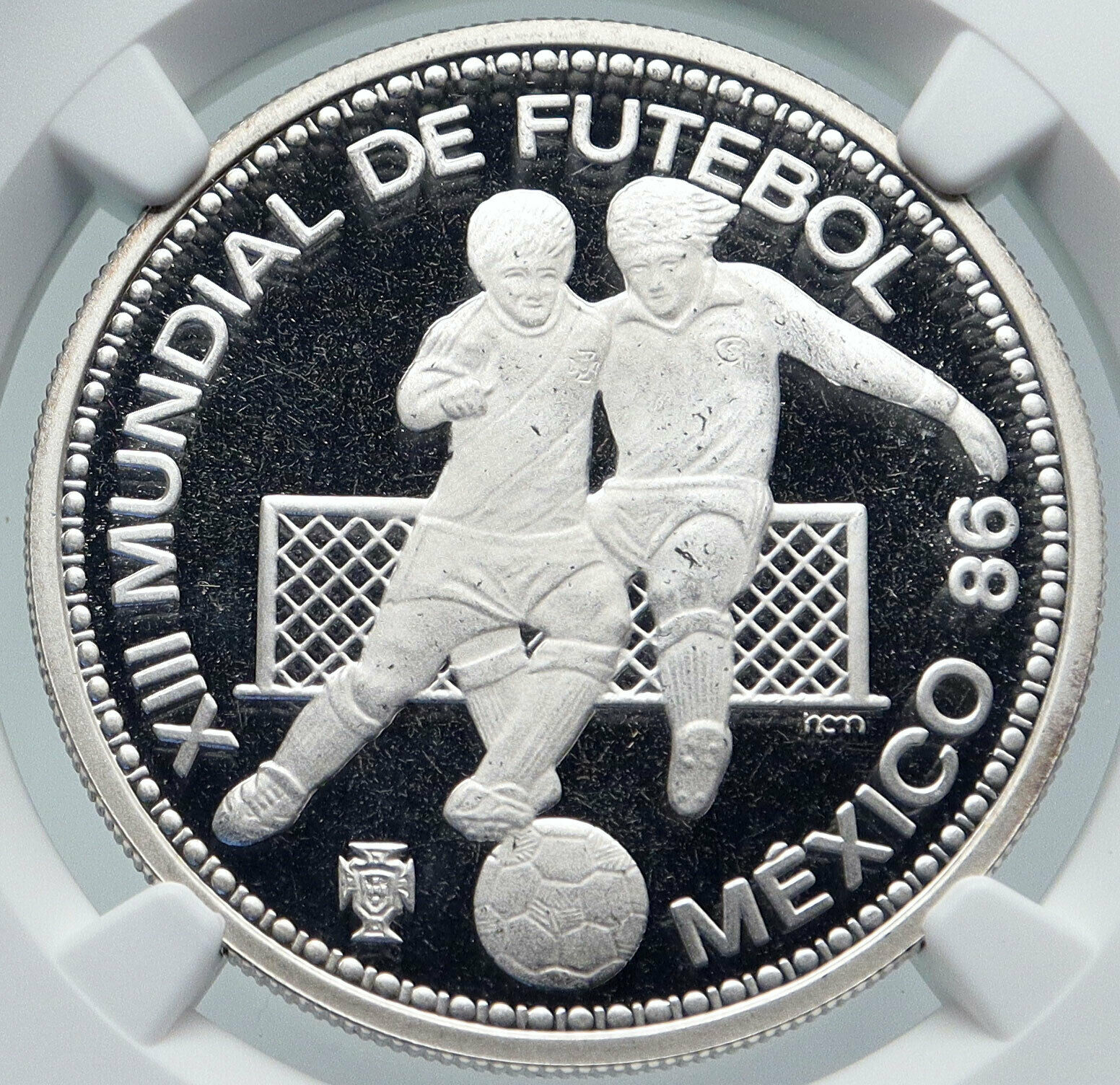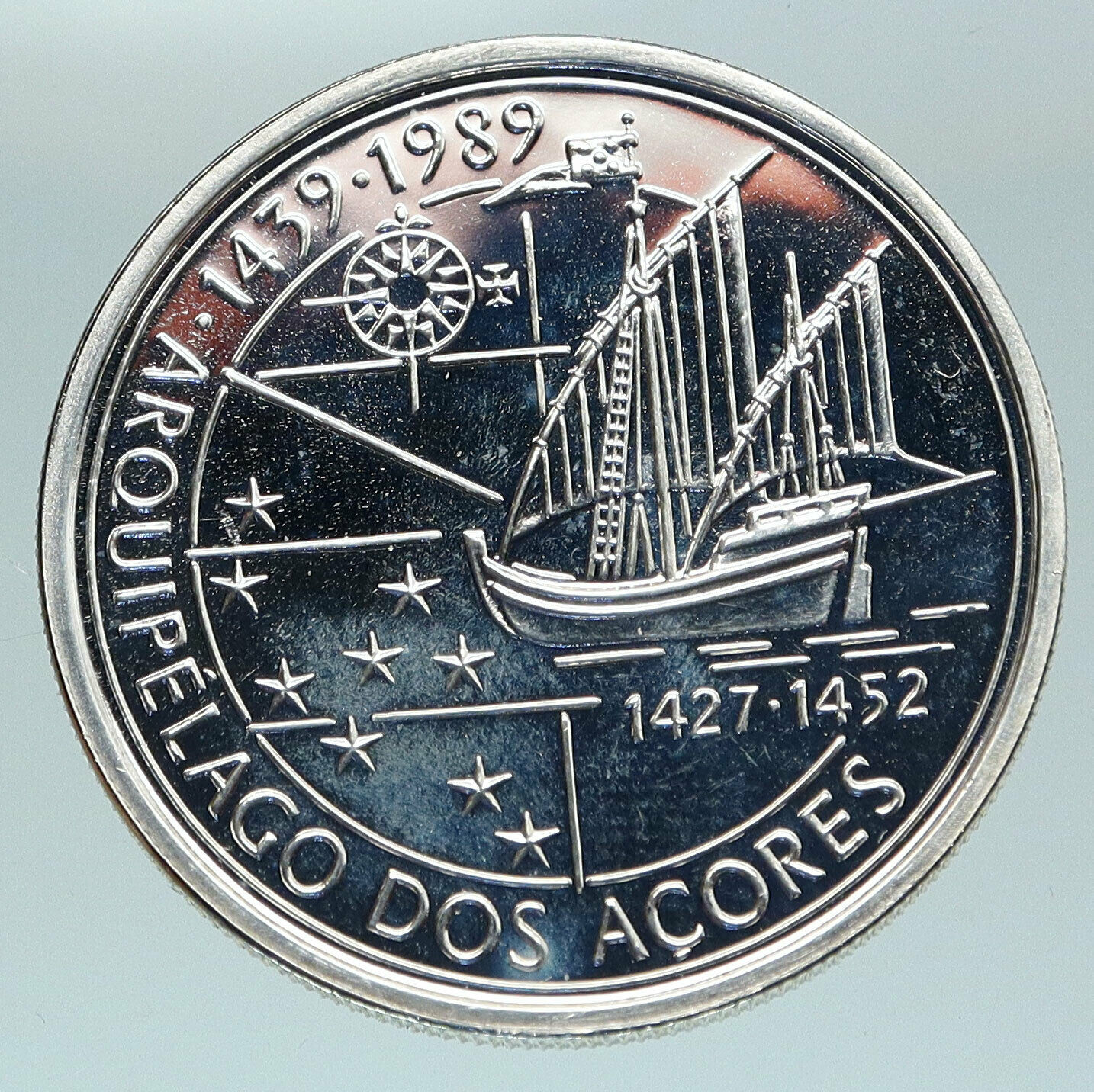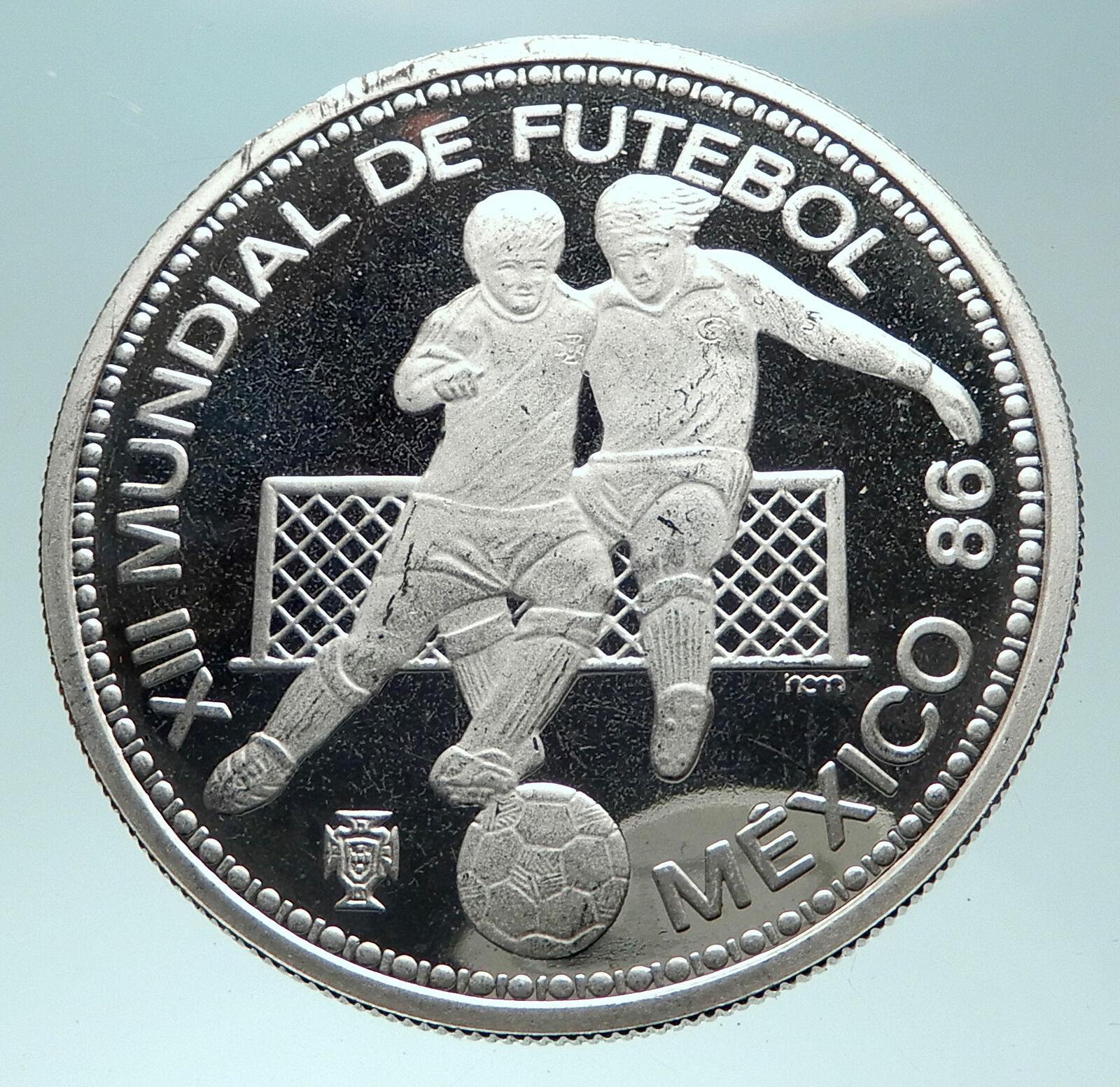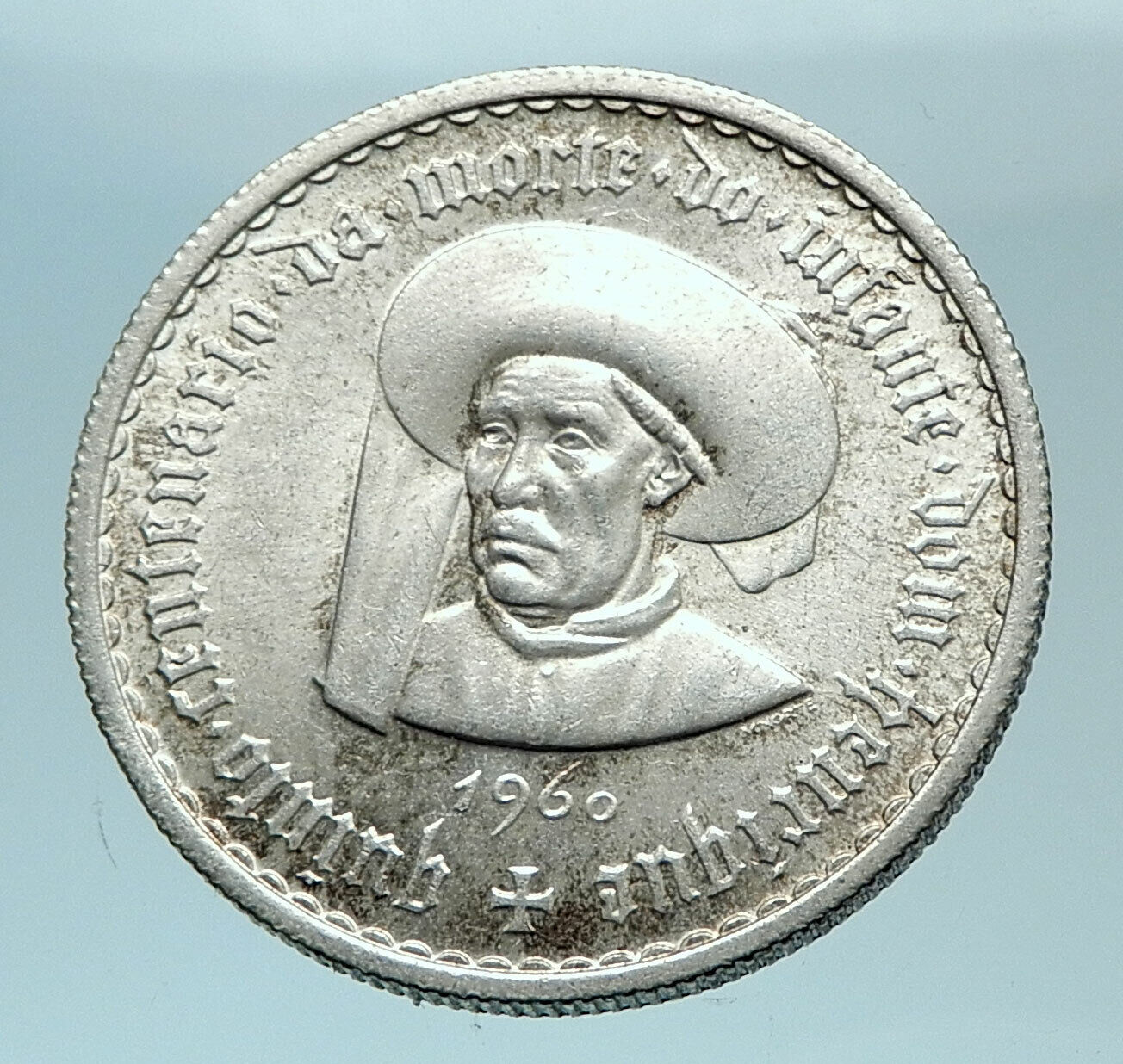|
Portugal
Mexico World Cup 1986
1986 Proof Silver 100 Escudos 34mm (16.47 grams) 0.925 Silver (0.4907 oz. ASW)
Reference: KM# 637a
REPÚBLICA PORTUGUESA 19 86 100 ESCUDOS A GOMES, DEL. J. CABAÇO MOD., Coat-of-arms.
XIII MUNDIAL DE FUTEBOL MÉXICO 86, Players running after football, goal behind.
You are bidding on the exact item pictured, provided with a Certificate of Authenticity and Lifetime Guarantee of Authenticity.
 The 1986 FIFA World Cup, the 13th FIFA World Cup, was held in Mexico from 31 May to 29 June 1986. The tournament was the second to feature a 24-team format. With European nations not allowed to host after the previous World Cup in Spain, Colombia had been originally chosen to host the competition by FIFA but, largely due to economic reasons, was not able to do so and officially resigned in 1982. Mexico was selected as the new host in May 1983. This was the third FIFA World Cup tournament in succession that was hosted by a Spanish-speaking country, after Argentina 1978, and Spain 1982. The 1986 FIFA World Cup, the 13th FIFA World Cup, was held in Mexico from 31 May to 29 June 1986. The tournament was the second to feature a 24-team format. With European nations not allowed to host after the previous World Cup in Spain, Colombia had been originally chosen to host the competition by FIFA but, largely due to economic reasons, was not able to do so and officially resigned in 1982. Mexico was selected as the new host in May 1983. This was the third FIFA World Cup tournament in succession that was hosted by a Spanish-speaking country, after Argentina 1978, and Spain 1982.
It was won by Argentina (their second title, after winning in 1978). Argentina was captained by the 25-year old Diego Maradona, who played a large part in his team’s success. Maradona scored the “Hand of God” goal, as well as another voted “Goal of the Century”, in the same quarter-final against England. These were two of the five goals that Maradona scored during the tournament, and he also created another five for his teammates. Argentina beat West Germany 3-2 in the final at Mexico City’s Estadio Azteca. Total attendance was 2,394,031, an average per match of 46,039. Canada, Denmark and Iraq made their first appearances at the final stage.
The format of the competition changed from 1982. The final pair of matches in each group started at the same time and the second round was played on a knock-out basis rather than groups. The 24 teams qualified were divided into six groups of four (A to F). The top two teams and the four best third-place finishers from the six groups advanced to the knockout round of 16 teams. Italy were the defending champions, but were eliminated by France in the Round of 16.
The 1986 World Cup saw the appearance of an audience phenomenon dubbed the Mexican wave, which was popularised worldwide after featuring during the tournament.
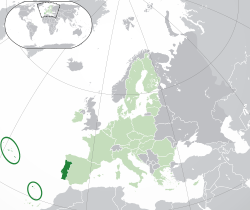  Portugal, officially the Portuguese Republic (Portuguese: República Portuguesa), is a country on the Iberian Peninsula, in Southwestern Europe. It is the westernmost country of mainland Europe, being bordered by the Atlantic Ocean to the west and south and by Spain to the north and east. The Portugal-Spain border is 1,214 km (754 mi) long and considered the longest uninterrupted border within the European Union. The republic also includes the Atlantic archipelagos of the Azores and Madeira, both autonomous regions with their own regional governments. Portugal, officially the Portuguese Republic (Portuguese: República Portuguesa), is a country on the Iberian Peninsula, in Southwestern Europe. It is the westernmost country of mainland Europe, being bordered by the Atlantic Ocean to the west and south and by Spain to the north and east. The Portugal-Spain border is 1,214 km (754 mi) long and considered the longest uninterrupted border within the European Union. The republic also includes the Atlantic archipelagos of the Azores and Madeira, both autonomous regions with their own regional governments.
 The territory of modern Portugal has been continuously settled, invaded and fought over since prehistoric times. The Pre-Celts, Celts, Phoenicians, Carthaginians and the Romans were followed by the invasions of the Visigothic and the Suebi Germanic peoples, who were themselves later invaded by the Moors. These Muslim peoples were eventually expelled during the Christian Reconquista. Portuguese nationality can be traced back to the creation of the First County of Portugal, in 868. In 1139, Afonso Henriques was proclaimed King of Portugal, thus firmly establishing Portuguese independence, under the Portuguese House of Burgundy. The territory of modern Portugal has been continuously settled, invaded and fought over since prehistoric times. The Pre-Celts, Celts, Phoenicians, Carthaginians and the Romans were followed by the invasions of the Visigothic and the Suebi Germanic peoples, who were themselves later invaded by the Moors. These Muslim peoples were eventually expelled during the Christian Reconquista. Portuguese nationality can be traced back to the creation of the First County of Portugal, in 868. In 1139, Afonso Henriques was proclaimed King of Portugal, thus firmly establishing Portuguese independence, under the Portuguese House of Burgundy.
In the 15th and 16th centuries, under the House of Aviz, which took power following the 1383-85 Crisis, Portugal expanded Western influence and established the first global empire, becoming one of the world’s major economic, political and military powers. During this time, Portuguese explorers pioneered maritime exploration in the Age of Discovery, notably under royal patronage of Prince Henry the Navigator and King João II, with such notable discoveries as Vasco da Gama’s sea route to India (1497-98), Pedro Álvares Cabral’s discovery of Brazil (1500), and Bartolomeu Dias’s reaching of the Cape of Good Hope. Portugal monopolized the spice trade during this time, under royal command of the Casa da Índia, and the Portuguese Empire expanded with military campaigns led in Asia, notably under Afonso de Albuquerque, who was known as the “Caesar of the East”.
The destruction of Lisbon in a 1755 earthquake, the country’s occupation during the Napoleonic Wars, the independence of Brazil (1822), and the Liberal Wars (1828-1834), all left Portugal crippled from war and diminished in its world power. After the 1910 revolution deposed the monarchy, the democratic but unstable Portuguese First Republic was established, later being superseded by the “Estado Novo” right-wing authoritarian regime. Democracy was restored after the Portuguese Colonial War and the Carnation Revolution in 1974. Shortly after, independence was granted to all its colonies and East Timor, with the exception of Macau, which was handed over to China in 1999. This marked the end of the longest-lived European colonial empire, leaving a profound cultural and architectural influence across the globe and a legacy of over 250 million Portuguese speakers today.
Portugal is a developed country with a high-income advanced economy and high living standards. It is the 5th most peaceful country in the world, maintaining a unitary semi-presidential republican form of government. It has the 18th highest Social Progress in the world, putting it ahead of other Western European countries like France, Spain and Italy. It is a member of numerous international organizations, including the United Nations, the European Union, the eurozone, OECD, NATO and the Community of Portuguese Language Countries. Portugal is also known for having decriminalized the usage of all common drugs in 2001, the first country in the world to do so. However, the sale and distribution of these drugs is still illegal in Portugal.
|





 The 1986 FIFA World Cup, the 13th FIFA World Cup, was held in Mexico from 31 May to 29 June 1986. The tournament was the second to feature a 24-team format. With European nations not allowed to host after the previous World Cup in Spain, Colombia had been originally chosen to host the competition by FIFA but, largely due to economic reasons, was not able to do so and officially resigned in 1982. Mexico was selected as the new host in May 1983. This was the third FIFA World Cup tournament in succession that was hosted by a Spanish-speaking country, after Argentina 1978, and Spain 1982.
The 1986 FIFA World Cup, the 13th FIFA World Cup, was held in Mexico from 31 May to 29 June 1986. The tournament was the second to feature a 24-team format. With European nations not allowed to host after the previous World Cup in Spain, Colombia had been originally chosen to host the competition by FIFA but, largely due to economic reasons, was not able to do so and officially resigned in 1982. Mexico was selected as the new host in May 1983. This was the third FIFA World Cup tournament in succession that was hosted by a Spanish-speaking country, after Argentina 1978, and Spain 1982. 
 Portugal, officially the Portuguese Republic (Portuguese: República Portuguesa), is a country on the Iberian Peninsula, in Southwestern Europe. It is the westernmost country of mainland Europe, being bordered by the Atlantic Ocean to the west and south and by Spain to the north and east. The Portugal-Spain border is 1,214 km (754 mi) long and considered the longest uninterrupted border within the European Union. The republic also includes the Atlantic archipelagos of the Azores and Madeira, both autonomous regions with their own regional governments.
Portugal, officially the Portuguese Republic (Portuguese: República Portuguesa), is a country on the Iberian Peninsula, in Southwestern Europe. It is the westernmost country of mainland Europe, being bordered by the Atlantic Ocean to the west and south and by Spain to the north and east. The Portugal-Spain border is 1,214 km (754 mi) long and considered the longest uninterrupted border within the European Union. The republic also includes the Atlantic archipelagos of the Azores and Madeira, both autonomous regions with their own regional governments. The territory of modern Portugal has been continuously settled, invaded and fought over since prehistoric times. The Pre-Celts, Celts, Phoenicians, Carthaginians and the Romans were followed by the invasions of the Visigothic and the Suebi Germanic peoples, who were themselves later invaded by the Moors. These Muslim peoples were eventually expelled during the Christian Reconquista. Portuguese nationality can be traced back to the creation of the First County of Portugal, in 868. In 1139, Afonso Henriques was proclaimed King of Portugal, thus firmly establishing Portuguese independence, under the Portuguese House of Burgundy.
The territory of modern Portugal has been continuously settled, invaded and fought over since prehistoric times. The Pre-Celts, Celts, Phoenicians, Carthaginians and the Romans were followed by the invasions of the Visigothic and the Suebi Germanic peoples, who were themselves later invaded by the Moors. These Muslim peoples were eventually expelled during the Christian Reconquista. Portuguese nationality can be traced back to the creation of the First County of Portugal, in 868. In 1139, Afonso Henriques was proclaimed King of Portugal, thus firmly establishing Portuguese independence, under the Portuguese House of Burgundy.

